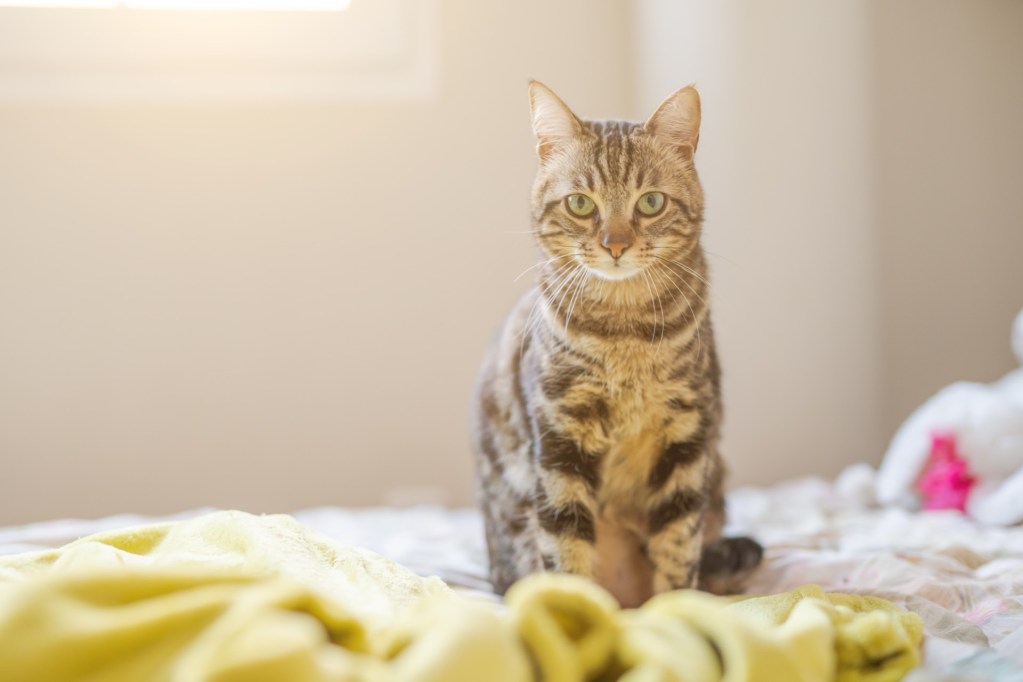
No one likes to ask, “Why is my cat peeing on my bed?” but here we are. It can be so frustrating! Noticing that your cat peed on your fresh-out-of-the-washing-machine sheets is one of the most irritating things that can happen. There are a lot of different reasons besides your cat just being a jerk that explain why she would do such a thing. Understanding the “why” will help you figure out what is really going on inside of your furry feline’s head, so you can then determine how to stop this unwanted behavior.
While many believe the primary reason cats pee on the bed is because they’re just being sassy, this is usually not the case. Read on to learn why your cat has picked up this undesirable habit and what you can do to put an end to it.
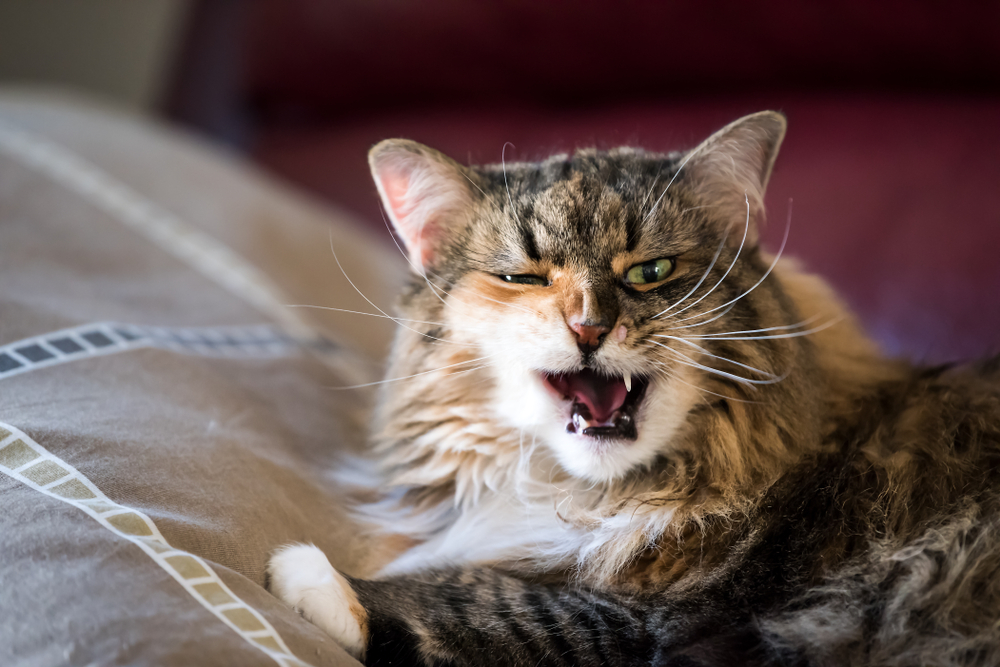
Why do cats pee on the bed?
Whether it’s related to medical issues, going potty on the bed is a serious problem that you should stop your cat from doing. But first, you have to determine the cause of the behavior. Some of the most common reasons cats pee on the bed include:
- An underlying medical condition. A urinary tract infection, diabetes, and kidney disease are the top three reasons your cat may have difficulty controlling their bladder. This may be the case in cats that urinate on your bed and in other places besides their litter box. If you notice this out-of-the-ordinary behavior, it’s essential to bring your cat to the vet immediately.
- Stress and anxiety. When cats become overwhelmed and stressed, they sometimes use urination as a coping mechanism. If there have been any recent changes in your home, your cat may be stressed or anxious about various factors that will cause them to pee outside the litter box.
- Attachment issues. Since your natural scent fills your bed, your cat probably finds the cozy spot very comforting when you’re away. If you have a kitty that doesn’t like to be apart, though, they may urinate on your bed to combine her scent with your scent, for comfort.
- Jealousy. Adding a new cat, dog, or even a baby to the home could create jealous feelings in your cat and may cause your cat to feel threatened. She will want to mark her territory, and your bed may be the prime spot for this behavior.
- Unappealing litter box conditions. If your cat’s litter box isn’t up to her standards, she may urinate in your bed to let you know. Whether you haven’t been scooping the poop often enough or the litter box isn’t the right size, your cat will avoid the litter box entirely if she doesn’t feel comfortable using it. Cats are highly particular and might protest the litter box’s location, the type of box, and even the type of litter.
- Your cat isn’t fixed. A cat that isn’t spayed or neutered may spray and mark furniture, walls, and carpets to mark their territory. In this case, the solution is easy — call your vet and schedule an appointment to get your cat spayed or neutered.
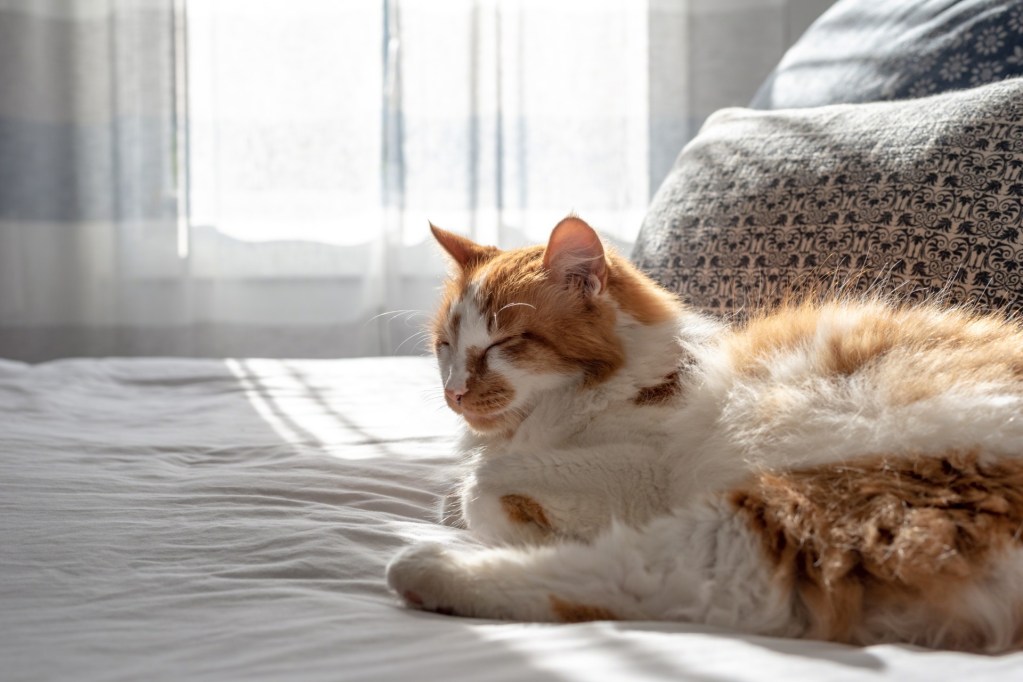
What can you do to stop your cat from peeing on the bed?
As you’ve seen, the best way to stop this behavior is to find its root cause. Checking in with your veterinarian is usually the best first step, as they can rule out any medical causes for concern. If your veterinarian clears your cat of any medical ailments, you can try some of these tactics to help keep your bed clean:
- Tire your cat out with long play sessions to reduce anxiety and stress.
- Prioritize cuddle time so your cat feels loved and secure.
- Ensure your cat’s litter box is always clean.
- Try out new litter boxes and litter box locations to provide the perfect conditions for your cat.
- Find any outside stressors that may be causing your cat anxiety.
- Make the bed an unattractive place with unappealing scents or a scat mat.
- Encourage litter box use with treats as positive reinforcement.
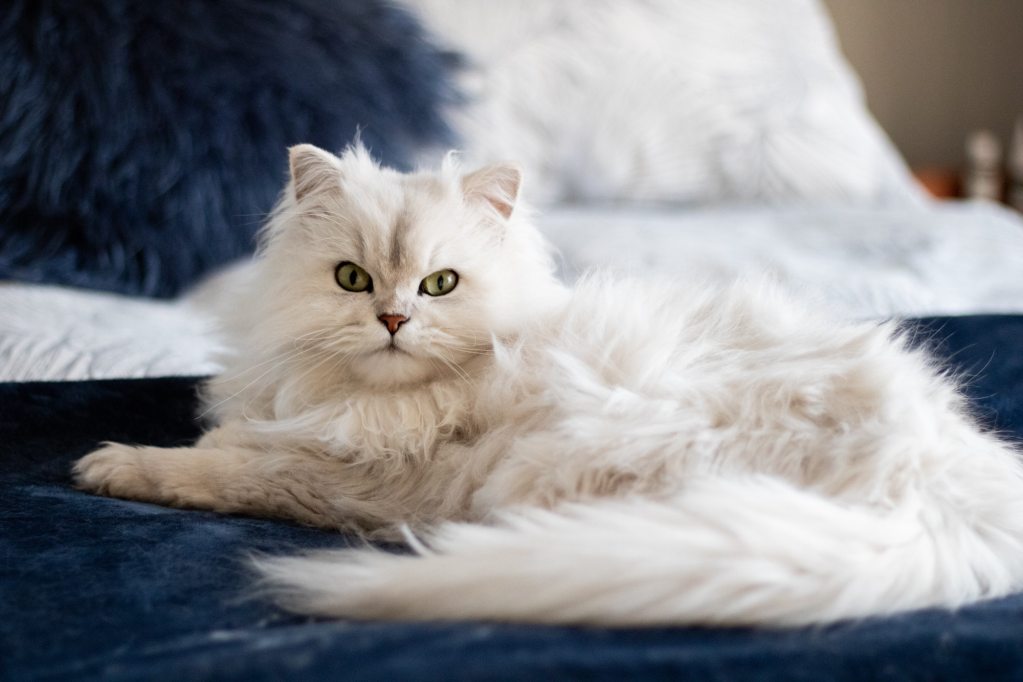
How to clean cat pee from your bed
One of the most important things to do after a cat urinates on the bed is to clean the area thoroughly. This will not only give you a pee-free place to sleep at night, but will also help prevent any repeat offenses. As cat owners know, though, cleaning and deodorizing cat urine is easier said than done.
The easiest step to take is to remove all bedding from the mattress and put it directly into the wash. The longer a stain sits, the deeper it will set! An extra warm or long wash might be a good idea if you can spare the time, too. When it comes to your mattress, though, blotting the area with a dry towel to soak up excess liquid is a great starting point.
When you’re ready to treat the stain, mattress company Casper recommends creating a stain-fighting mixture containing 2 to 3 tablespoons of laundry detergent, 1 cup of white vinegar, and 2 cups cold water. Spraying this on the stain is the best way to go, then allow the solution to soak in for 10 to 15 minutes. Afterward, cover the stain with baking soda, let it soak everything up for 8-10 hours, then vacuum it up!
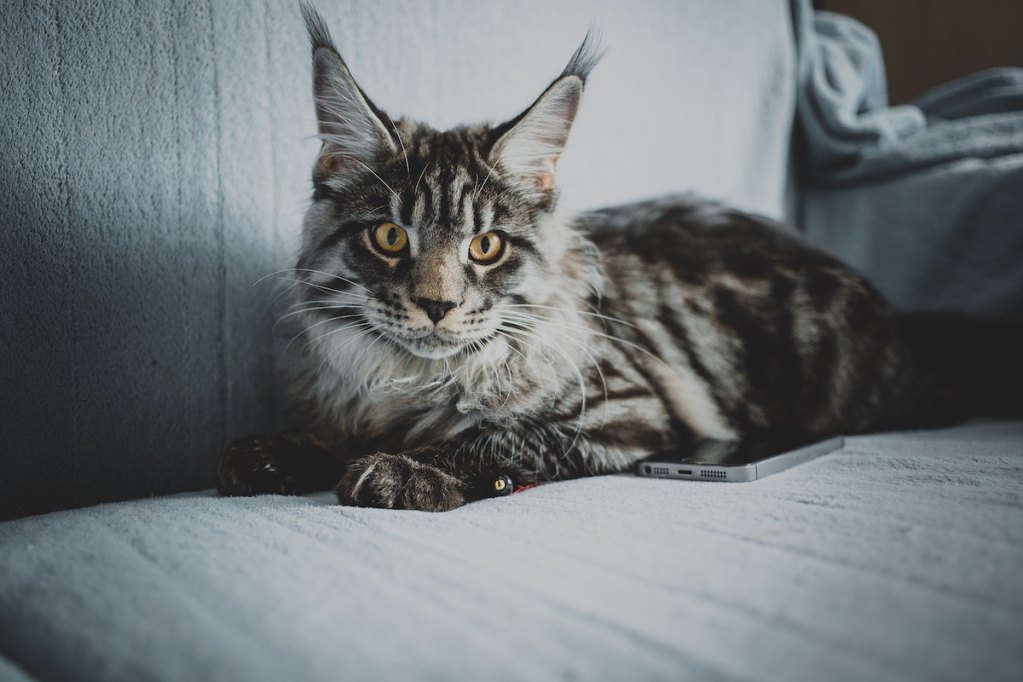
What not to do if your cat pees on your bed
You’ve probably heard the same not-so-helpful advice we all have heard: “Just rub their nose in it. That will make her stop.” Contrary to popular belief, yelling at your cat, spraying your cat with a bit of water, or rubbing their nose in their mess won’t actually improve her behavior. It could even make things worse. If your cat is urinating outside the litter box due to stressors, making her more fearful will only cause her behavior to continue. When in doubt, your best course of action is to consult a veterinarian.
Answering the question, “Why does my cat pee on my bed?” is just the first step. In addition to addressing the specific issue causing your cat to pee on the bed, you’ll need to take steps to help your kitty “reset.” Start by thoroughly cleaning your bedding, so it no longer smells like pee.
While it’s often recommended to cover your bed in plastic because cats hate the texture, veterinarians strongly caution against doing so. Leaving your cat unattended with plastic tarps, bags, or shower curtains can have severe consequences, as your cat may ingest some of the plastic, leading to intestinal blockages, or she could even suffocate if she becomes tangled. Instead, you can retrain your cat to associate the bed with bonding time and food. Make sure you cuddle your cat and feed her treats in bed. Because cats are averse to urinating where they eat, teaching your fur baby that your bed is a place for snuggling and snacking will teach her not to treat your mattress as her litter box. Better yet — keep the bedroom door closed!
Underlying medical conditions or stress can cause your cat to urinate on your bed. While this behavior is frustrating, unsanitary, and pretty gross, it can signify that your cat needs help. If this behavior arises, bringing your cat to the veterinarian for further diagnosis is essential. It may be the most effective way to resolve the issue. If your cat has no medical problems, this type of activity could simply be a behavioral issue that needs addressing. Either way, getting to the bottom of your cat’s inappropriate urination will ensure a healthier and happier home for both of you.
Editors' Recommendations
- Cats chirping at birds is totally normal (and here’s why you should encourage it)
- Why do cats twitch in their sleep? The real reasons behind this curious behavior
- Why do cats cover their face when they sleep? This adorable behavior, explained
- Why do cats lick themselves? It goes beyond just cat grooming
- Why do cats open their mouths when they smell? It’s for a really cool reason


